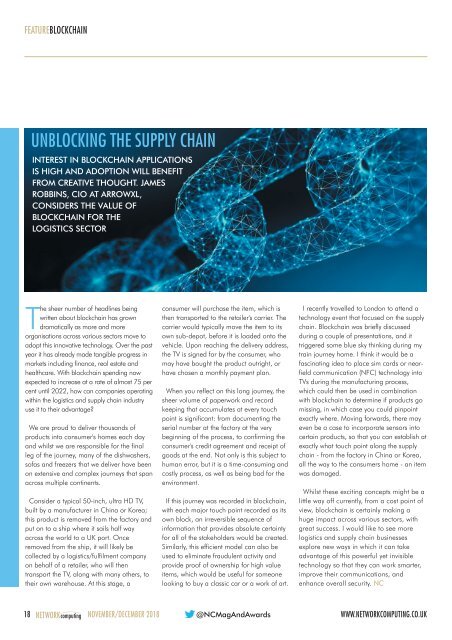NC1811
You also want an ePaper? Increase the reach of your titles
YUMPU automatically turns print PDFs into web optimized ePapers that Google loves.
FEATUREBLOCKCHAIN<br />
UNBLOCKING THE SUPPLY CHAIN<br />
INTEREST IN BLOCKCHAIN APPLICATIONS<br />
IS HIGH AND ADOPTION WILL BENEFIT<br />
FROM CREATIVE THOUGHT. JAMES<br />
ROBBINS, CIO AT ARROWXL,<br />
CONSIDERS THE VALUE OF<br />
BLOCKCHAIN FOR THE<br />
LOGISTICS SECTOR<br />
The sheer number of headlines being<br />
written about blockchain has grown<br />
dramatically as more and more<br />
organisations across various sectors move to<br />
adopt this innovative technology. Over the past<br />
year it has already made tangible progress in<br />
markets including finance, real estate and<br />
healthcare. With blockchain spending now<br />
expected to increase at a rate of almost 75 per<br />
cent until 2022, how can companies operating<br />
within the logistics and supply chain industry<br />
use it to their advantage?<br />
We are proud to deliver thousands of<br />
products into consumer's homes each day<br />
and whilst we are responsible for the final<br />
leg of the journey, many of the dishwashers,<br />
sofas and freezers that we deliver have been<br />
on extensive and complex journeys that span<br />
across multiple continents.<br />
Consider a typical 50-inch, ultra HD TV,<br />
built by a manufacturer in China or Korea;<br />
this product is removed from the factory and<br />
put on to a ship where it sails half way<br />
across the world to a UK port. Once<br />
removed from the ship, it will likely be<br />
collected by a logistics/fulfilment company<br />
on behalf of a retailer, who will then<br />
transport the TV, along with many others, to<br />
their own warehouse. At this stage, a<br />
consumer will purchase the item, which is<br />
then transported to the retailer's carrier. The<br />
carrier would typically move the item to its<br />
own sub-depot, before it is loaded onto the<br />
vehicle. Upon reaching the delivery address,<br />
the TV is signed for by the consumer, who<br />
may have bought the product outright, or<br />
have chosen a monthly payment plan.<br />
When you reflect on this long journey, the<br />
sheer volume of paperwork and record<br />
keeping that accumulates at every touch<br />
point is significant: from documenting the<br />
serial number at the factory at the very<br />
beginning of the process, to confirming the<br />
consumer's credit agreement and receipt of<br />
goods at the end. Not only is this subject to<br />
human error, but it is a time-consuming and<br />
costly process, as well as being bad for the<br />
environment.<br />
If this journey was recorded in blockchain,<br />
with each major touch point recorded as its<br />
own block, an irreversible sequence of<br />
information that provides absolute certainty<br />
for all of the stakeholders would be created.<br />
Similarly, this efficient model can also be<br />
used to eliminate fraudulent activity and<br />
provide proof of ownership for high value<br />
items, which would be useful for someone<br />
looking to buy a classic car or a work of art.<br />
I recently travelled to London to attend a<br />
technology event that focused on the supply<br />
chain. Blockchain was briefly discussed<br />
during a couple of presentations, and it<br />
triggered some blue sky thinking during my<br />
train journey home. I think it would be a<br />
fascinating idea to place sim cards or nearfield<br />
communication (NFC) technology into<br />
TVs during the manufacturing process,<br />
which could then be used in combination<br />
with blockchain to determine if products go<br />
missing, in which case you could pinpoint<br />
exactly where. Moving forwards, there may<br />
even be a case to incorporate sensors into<br />
certain products, so that you can establish at<br />
exactly what touch point along the supply<br />
chain - from the factory in China or Korea,<br />
all the way to the consumers home - an item<br />
was damaged.<br />
Whilst these exciting concepts might be a<br />
little way off currently, from a cost point of<br />
view, blockchain is certainly making a<br />
huge impact across various sectors, with<br />
great success. I would like to see more<br />
logistics and supply chain businesses<br />
explore new ways in which it can take<br />
advantage of this powerful yet invisible<br />
technology so that they can work smarter,<br />
improve their communications, and<br />
enhance overall security. NC<br />
18 NETWORKcomputing NOVEMBER/DECEMBER 2018 @NCMagAndAwards<br />
WWW.NETWORKCOMPUTING.CO.UK

















